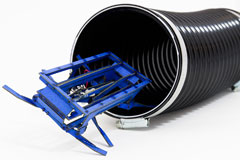Sep 7 2013
Dash Robotics, founded by UC Berkeley alumni and students, today unveiled a new high performance, low-cost "origami" robot that runs fast on six legs, weighs only half an ounce and can be easily built at home.
 Dash has six insect-like legs that can run at high speed and climb on a variety of surfaces
Dash has six insect-like legs that can run at high speed and climb on a variety of surfaces
Dash is a bio-inspired robot that fits in the palm of your hand, and is available today to the first 1,000 supporters of a new crowdfunding campaign.
Dash expects to be the first company to commercially offer an advanced robot for less than $70. The company can achieve this price point — a breakthrough in commercial robotics — through a combination of new materials, design and manufacturing processes that no other company uses today.
Dash will deliver its first robots through the crowdfunding program launched today by Dragon Innovation to move its robots from research prototype to the "beta" product phase, in anticipation of launching Dash commercially next year. To see Dash in action and grab one of the first 1,000 robots, visit the Dash crowdfunding campaign page.
Controlled with a smartphone, Dash has six insect-like legs, so it can run at high speed and climb on a variety of surfaces where wheels will not operate. The robots are shipped as a 2D kit consisting of an ultra-lightweight and surprisingly durable composite of micro-thin plastic and cardboard. The kits are folded at home into a 3D bug-like shape, almost origami-style. Simple electronics for controlling the robots, included with the kit, are also easy for anyone to install.
"With Dash, we're making science and engineering simple, fun and accessible to anyone," said Nick Kohut, chief executive officer and co-founder of Dash Robotics. "Most educational robots today cost hundreds of dollars — that's not realistic for most families. My co-founders and I are focused intensely on creating a robot that captures the imagination of young people everywhere by imitating animals in a mechanical form, and at a very affordable price. Our goal is to put a robot into everyone's hands."
Charles Huang, advisor to Dash Robotics and inventor of Guitar Hero, said, "Dash is a fantastic product for the robot enthusiast or budding maker. It's a fun learning experience at an affordable price. I am very impressed with the team's research background at UC Berkeley and their commitment to creating great consumer robots."
As doctoral students at UC Berkeley, the Dash team set out to bring low-cost bio-inspired robotics design into the commercial realm. Dash is now becoming the first company to commercialize this innovative practice using years of UC Berkeley research funded by the National Science Foundation.
Working with world-renowned biologists, the team studied principles of a broad range of animals - particularly the running movements cockroaches and lizards. They distilled their findings about the positions and movements of limbs — particularly running legs — into mechanical reality to enable their robots to function with a high degree of speed and flexibility on a variety of surfaces, just like an insect or animal.
Most robots today are constructed either with hundreds of expensive injection-molded parts, or metal fastened together with steel bearings. They require an individual motor, or actuator, for each joint, making them slow, expensive and heavy. To overcome these fundamental challenges, Dash constructs its robots with a material made up of a sandwich of lightweight cardboard and super-thin polyester that is 1,000th of an inch thick.
This material is cut into miniature pieces about the size of a postage stamp, which are fastened together using flexible plastic joints, or flexures, rather than ball bearings. Because of this design approach, Dash robots require only one or two actuators — another significant reduction in cost for both prototyping and manufacturing.
This rare combination of new composite material, intelligent design and innovative manufacturing results in robots that have much greater mechanical flexibility, are much faster, are lighter in weight and can be sold at a fraction of the cost of any competitor.
While the initial Dash robots are designed to be educational tools that help kids learn about science, technology and biology, the longer-term implications for industrial robotics are nearly limitless. Dash will continue to explore how its low-cost, high performance robots can help solve problems across a broad number of industries including energy, search and rescue and space exploration.
There are many options for supporting the launch of Dash Robotics through its crowdfunding campaign. Awards include a Beta Dash kit (a fully capable Dash robot) for a donation of $65 U.S., as well as accessories, and additional versions of Dash. For the true enthusiast, there's even a Dash Robotics Lab Tour and dinner with the founders.